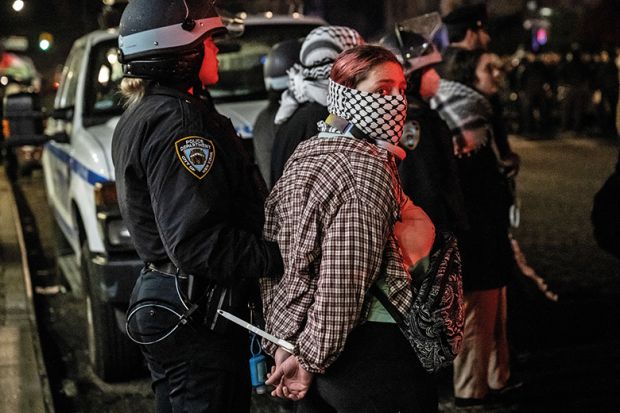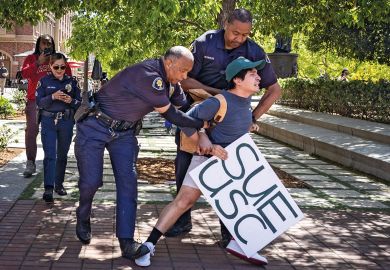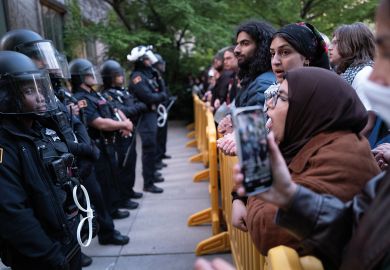As US campus confrontations evaporate with the summer break, a key but mostly behind-the-scenes constituency – the parents of students – is flexing its power in ways that could be critical in shaping the long-term effects and future course of free speech uprisings.
Many US parents – especially those with substantial financial and political clout – have been limiting or even dictating their children’s college acceptance decisions based on their own protest-related perspectives. Some others have begun filing lawsuits against institutions over their responses to the protests.
The protests have largely involved students demanding protections for Palestinian civilians suffering and dying under Israeli military bombardment. Parents can be found on both sides of that divide – some complaining that college presidents have not done enough to prevent classroom disruption, and others arguing that police power and institutional sanctions have been unfairly wielded against non-violent demonstrators.
From a legal perspective, the parents of student protesters who were arrested or suspended appear to have the stronger position, said Robert Kleinfeldt, a Florida lawyer who handles First Amendment cases.
Campus resource: Changing campus protests from disruptions to learning opportunities
The argument in such cases, Mr Kleinfeldt said, is that the college or university broke its contract with its students by unfairly denying them the experience they purchased with their tuition fees. “Because you have a right to be there – you’ve paid to be there,” he said.
But from a sheer power perspective, the parents who dislike the student protests appear to have the upper hand, said Mimi Doe, a college admissions adviser who counsels wealthy families in the US and abroad. Ms Doe is chief executive and a co-founder of Top Tier Admissions, a service so exclusive that she describes working with parents who can express their displeasure by cutting donations to the likes of the University of Pennsylvania or by “stepping off the board at Harvard”.
And overwhelmingly, if not exclusively, that moneyed tier consists of parents who are alarmed by the sense of chaos surrounding the student protest encampments seen in recent weeks across dozens of US campuses, and will not allow their children to attend such institutions.
“They are all dismayed by this,” another elite-oriented college admissions adviser, Brian Taylor, managing partner of Ivy Coach, said of the parents he encounters.
“They’re impacting where they can with their money,” Ms Doe said. “It’s a certain subset of parents, for sure, but those parents have a lot of power, and they are not happy about a lot of what’s going on – not just with the student activity, but more importantly, with the presidents and chancellors at these colleges, and what they’re saying.”
And the use of legal power by such parents in higher education seems to be a natural evolution of what has been happening at the school level in the US, she said, where parents of financial means increasingly find they can overpower local school officials.
Ms Doe said she has been an admissions adviser for about 20 years, “and I’ve seen – in the past three, four or five years – parents become even more litigious to their children’s high schools, if things are not going according to their plan”.
“So if a student is suspended for breaking a rule, it’s very clear the parents want to engage a lawyer,” she said.
A common target for such alienation at the post-secondary level, she and other experts said, is Columbia University. That Ivy League institution was the spark for the nationwide explosion of student protest, right after Republican members of the US Congress called Columbia president Baroness Shafik to Washington for a public hearing that led her to immediately order police to clear a largely peaceful gathering of student demonstrators from the lawn of her New York City campus.
Parents opposed to pro-Palestinian activism often have turned to institutions they see as offering a clearer commitment to banning overt criticism of Israel, such as Brandeis University, with its historical Jewish roots.
Some parents, mirroring the political arguments made by congressional Republicans, also have suggested that they fear companies will not hire the graduates of such institutions, seeing the prolonged protest encampments as evidence that their students do not face rigorous academic demands.
“Back in the day,” Ms Doe said, “if the kid got into Columbia, oh my gosh, it wouldn’t matter if it was on fire – they still would want to go. But it’s the parent, not the child, making these decisions.”
Still, the legal system may ultimately shape the outcomes for many of the underlying disputes, Mr Kleinfeldt said. And that is probably for the best, he said, given that the nation’s partisan divide runs so deep that even US law enforcement is regarded as politically compromised. Some universities are dropping legal charges against their students, and some local prosecutors are declining to pursue such cases.
In such an environment, Mr Kleinfeldt said, “the court system is probably going to be the only venue for redress”.
POSTSCRIPT:
Print headline: US demos stir parents to flex power
Register to continue
Why register?
- Registration is free and only takes a moment
- Once registered, you can read 3 articles a month
- Sign up for our newsletter
Subscribe
Or subscribe for unlimited access to:
- Unlimited access to news, views, insights & reviews
- Digital editions
- Digital access to THE’s university and college rankings analysis
Already registered or a current subscriber?








